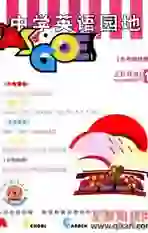新目标英语九年级要点与中考链接(Units 10~12)
2008-12-01郭克晴
郭克晴
Unit 10
[中考真题] (2008兰州市) To my disappointment the teacher_______when I_______at his office.
A. left, had arrived B. left, arrived
C. had left, had arrived D. had left, arrived
[答案与简析] 答案为D。 根据句意我们可知,老师“离开”这个动作发生在我“到达”之前。“到达”是过去的事情,那么“离开”就成了“过去的过去”,所以第一空填过去完成时had left, 第二空填一般过去时arrived。
[中考真题] (2008潍坊市) —Boys and girls! Please_______your compositions after class.
—Oh, my God! I_______it at home.
A. hand in; forgot B. hand in; left
C. hand out; forgot D. hand out; left
[答案与简析] 答案为B。 hand in意为“上交”, hand out意为“分发”,不合题意。因此,可先排除C和D两项。 forget意为“遗忘”,指忘记一件具体的东西,但不与具体的地点搭配。 leave意为“把某物遗忘在某处”,后面应接具体的地点。答句中有地点状语at home, 故第二个空白处应填left。
[中考真题] (2008青海省) —Sam, you look tired today. What's the matter?
—I was_______busy_______I didn't go to bed until midnight yesterday.
A. too; to B. so; that
C. so; to
[答案与简析] 答案为B。 “so + 形容词/副词 + that从句”意为“如此……以致……”, that引导一个结果状语从句。
[中考真题] (2008天津市) The man also wrote_______of beautiful pieces of music for the orchestra.
A. hundred B. six hundred
C. a hundred D. hundreds
[答案与简析] 答案为D。 hundred和具体的基数词连用时,无需用复数形式,也不能在其后加of。 hundreds of意为“数以百计的”,其中的hundred要用复数形式,且后面还要加介词of。
[中考真题] (2008重庆市) This is my twin sister Lucy. Both she and I_______good at drawing.
A. am B. is C. are D. be
[答案与简析] 答案为C。 both ... and意为“两者都……”。用它连接两个主语时,谓语动词用复数形式。
Unit 11
[中考真题] (2008河南省) —May I come in? I'm sorry I am late.
—Come in, please. But could you please tell me_______ ?
A. why you are late again
B. what were you doing then
C. who you talked with
D. how do you come to school
[答案与简析] 答案为A。 宾语从句中应该主语在前,谓语在后。据此可先排除B、D两项。根据上文中的“I'm sorry I am late”, 我们可以确定含空白处的句子问的是再次迟到的原因。
[中考真题] (2008潍坊市) These story books for children are awfully written. They are_______interesting_______exciting.
A. either; or B. neither; nor
C. both; and D. not only; but also
[答案与简析] 答案为B。 A项意为“或者……或者……”, B项意为“既不……也不……”, C项意为“……和……两者都”, D项意为“不但……而且……”。由第一句“These story books for children are awfully written”我们可知,两个空白处应该分别填neither和nor。
[中考真题] (2008南京市) —Why did Miss Wang look so worried when we saw her?
—Because she wondered_______ .
A. where did the other students go
B. when would the policeman come
C. what her students have done during the trip
D. if her students had survived the earthquake
[答案与简析] 答案为D。 宾语从句中理应主语在前,谓语在后。据此,可以排除A和B两项。 wonder后面常接由if或whether引导的宾语从句,表示一种委婉的请求或疑问,根据句意及宾语从句中的时态呼应规则,只有D项符合句义。
[中考真题] (2008宿迁市) Helen learns to dance three times a week. Now she dances_______Anita does.
A. so good as B. as well as
C. as good as D. so well as
[答案与简析] 答案为B。 修饰动词dances的应为副词,因此可排除A和C两项。这是个肯定句,所以空白处只能填as well as。
Unit 12
[中考真题] (2008太原市) This disabled girl needs our help. We are_______to do something for her.
A. stopped B. invited C. supposed
[答案与简析] 答案为C。 既然“This disabled girl needs our help”, 我们就有“理应”为她做些事情。 “be supposed to do sth”可用来表达此意。
[中考真题] (2008咸宁市) —What are the people in Korea supposed to do when they meet for the first time?
—They are supposed to_______ .
A. kiss B. bow C. say hello D. shake hands
[答案与简析] 答案为B。 依照习俗,韩国人第一次见面时相互鞠躬致意。
[中考真题] (2008莆田市) Kate_______a piece of waste paper and put it into the rubbish bag.
A. threw away B. picked up
C. looked for
[答案与简析] 答案为B。 A项意为“扔掉”, B项意为“捡起,拾起”, C项意为“寻找”。当事人理应先捡起(picked up)废纸,再将其放进垃圾袋(put it into the rubbish bag)。
[中考真题] (2008泉州市) —Mr Chen is good at dancing. Who taught him?
—No one. He learnt it by_______ .
A. he B. his C. himself
[答案与简析] 答案为C。 learn ... by oneself相当于teach oneself, 意为“自学”。主语是He, 他“自学”跳舞,当然应是learnt it by himself。
